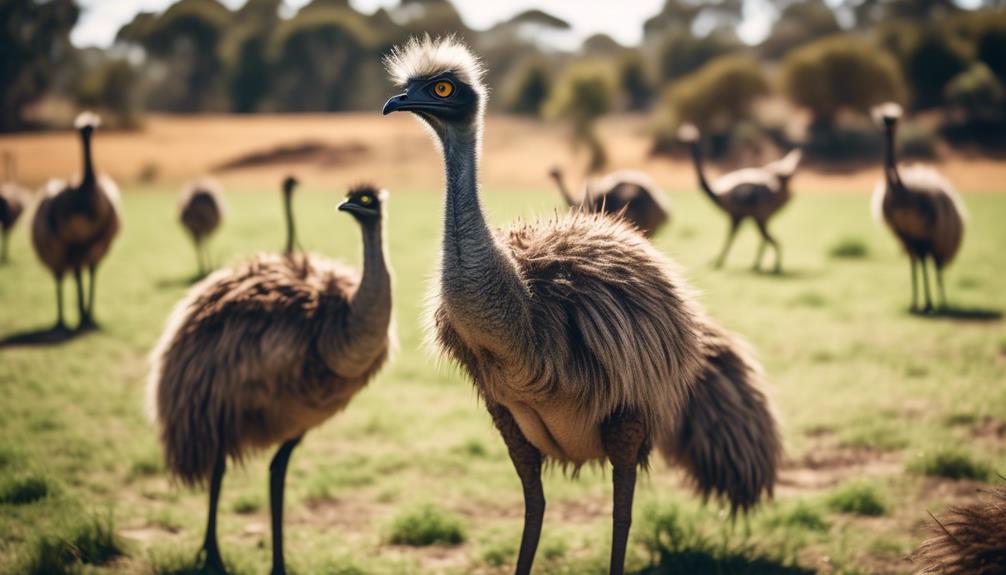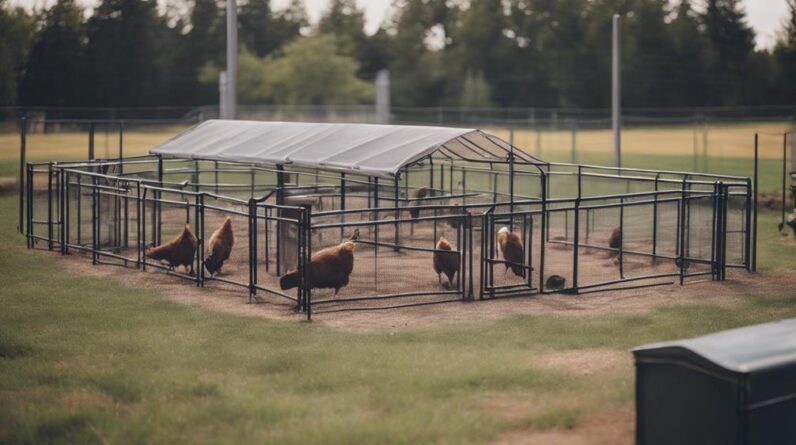
So, you've decided to enter the fascinating world of emu farming. Congratulations, you brave soul. But now comes the question: how do you engage with the emu farming community online? Fear not, for we have the answers you seek.
In this discussion, we will explore various strategies that will help you connect with like-minded emu enthusiasts, learn from seasoned experts, and maybe even make a few feathered friends along the way.
So, buckle up and get ready to embark on a digital journey that will take you deep into the heart of the emu farming community.
Benefits of Engaging With the Emu Farming Community

Engaging with the Emu Farming Community offers numerous benefits. One of the key advantages is access to a wealth of knowledge. By actively participating in this community, you can tap into a vast pool of expertise and experience. This allows you to gain valuable insights and learn from the successes and failures of fellow emu farmers.
Another benefit is the networking opportunities that come with being part of the Emu Farming Community. It is a supportive network where you can connect with like-minded individuals who share your passion for emu farming. Through networking, you can forge relationships with industry professionals, suppliers, and potential customers. This creates opportunities for partnerships and business growth.
The benefits of engaging with the Emu Farming Community extend beyond knowledge and networking. By collaborating with others in the industry, you can pool resources, share best practices, and work together to overcome common challenges. This collaborative environment fosters innovation and encourages the development of new ideas and techniques.
Moreover, being part of a community that values sharing and cooperation can enhance your reputation and credibility within the industry. Overall, actively engaging with the Emu Farming Community can lead to personal and professional growth, as well as increased success in the emu farming industry.
Joining Emu Farming Forums and Online Groups
To maximize your engagement with the Emu Farming Community, consider joining emu farming forums and online groups. These platforms provide an excellent opportunity to connect with fellow emu farmers, exchange ideas, and gain valuable insights. Here are three reasons why joining emu farming forums and online groups is beneficial:
- Finding emu farming mentors: Emu farming forums and online groups often have experienced farmers who are willing to share their knowledge and expertise. By joining these communities, you can connect with mentors who can guide you in your emu farming journey. They can offer valuable advice on various aspects such as breeding, feeding, and health management.
- Exploring emu farming research: Emu farming forums and online groups are great resources for staying updated on the latest research and developments in the industry. Members often share articles, studies, and research papers that can broaden your understanding of emu farming practices. By actively participating in discussions, you can also contribute to the collective knowledge of the community.
- Networking opportunities: Joining emu farming forums and online groups allows you to expand your network within the industry. You can connect with fellow farmers, suppliers, and experts, opening doors for collaborations, partnerships, and potential business opportunities. Building relationships with others who share your passion for emu farming can be immensely rewarding both personally and professionally.
Participating in Emu Farming Webinars and Online Events

You can enhance your knowledge and expertise in emu farming by actively participating in a variety of informative webinars and online events.
Hosting virtual workshops and participating in online Q&A sessions are excellent opportunities to connect with experts in the field and gain valuable insights.
Virtual workshops are interactive sessions where emu farmers and industry professionals share their expertise on specific topics. These workshops cover a wide range of subjects, such as emu nutrition, breeding techniques, disease management, and marketing strategies. By attending these workshops, you can learn about the latest advancements in emu farming and gain practical tips to improve your own operations.
Online Q&A sessions provide a platform for emu farmers to ask questions and seek guidance from experienced individuals. These sessions often feature industry experts who are well-versed in various aspects of emu farming. Participating in these sessions allows you to address specific challenges you may be facing on your farm and receive tailored advice.
To find emu farming webinars and online events, you can join emu farming forums and online groups, as they often share information about upcoming sessions. Additionally, agricultural websites, social media groups, and industry associations frequently host and promote these events.
Utilizing Social Media Platforms for Community Engagement
Social media platforms offer valuable opportunities for emu farmers to actively engage with the community and share their expertise. By utilizing these platforms effectively, you can build online relationships and create engaging content that resonates with your audience.
Here are three key strategies to consider:
- Know your audience: Understanding the needs and interests of your target audience is crucial for successful community engagement on social media. Conduct research to identify the demographics and preferences of emu farming enthusiasts. Tailor your content to address their specific concerns, providing valuable insights and practical tips.
- Consistency is key: Regularly posting content on social media platforms will help you establish a strong online presence and maintain a steady flow of interactions with your community. Develop a content calendar to plan and schedule your posts in advance. This will ensure that you consistently deliver valuable and engaging content to your audience.
- Encourage interaction: Building a sense of community on social media involves fostering conversations and encouraging audience participation. Pose questions, start discussions, and actively respond to comments and messages. This won't only show your expertise and willingness to help but also create a welcoming and interactive environment for the emu farming community.
Connecting With Emu Farming Influencers and Experts

Engaging with the emu farming community online opens up opportunities to connect with influential figures and industry experts in the field. By connecting with emu farming influencers, you can gain valuable insights and knowledge that can help you improve your own emu farming practices. These influencers are individuals who've established themselves as authorities in the emu farming industry and have a strong presence online. They often share their expertise and experiences through blog posts, social media updates, and online forums.
To connect with emu farming influencers, start by following them on social media platforms such as Twitter, Instagram, and Facebook. Engage with their content by liking, commenting, and sharing their posts. This won't only help you establish a relationship with them but also demonstrate your interest and commitment to the emu farming community.
In addition to connecting with influencers, it's also important to learn from industry experts. These experts are individuals who've extensive knowledge and experience in emu farming and are willing to share their insights with others. Look for online forums and discussion groups where these experts participate and actively engage with them by asking questions, seeking advice, and sharing your own experiences.
Sharing Your Experiences and Knowledge Through Blogging or Vlogging
Sharing your experiences and knowledge through blogging or vlogging provides a platform to educate others in the emu farming community and showcase your expertise. By creating informative emu farming podcasts, you can reach a wide audience and provide them with valuable insights and advice. Podcasts allow you to discuss various topics such as emu breeding, nutrition, and health, offering in-depth explanations and practical tips.
Hosting live Q&A sessions on emu farming techniques is another effective way to engage with the community. This interactive format allows you to directly address the questions and concerns of fellow emu farmers, providing real-time solutions and guidance. It also fosters a sense of camaraderie and collaboration within the community, as participants can learn from each other's experiences and expertise.
In addition to podcasts and live Q&A sessions, creating informative blog posts or vlogs can further enhance your role as a knowledgeable authority in the emu farming community. By sharing your personal experiences, challenges, and successes, you can connect with your audience on a more intimate level. This creates a sense of trust and authenticity, making it easier for others to relate to your content and benefit from your expertise.
Finding Online Resources and Educational Materials for Emu Farming

To further expand your knowledge and stay updated on the latest developments in emu farming, it's essential to access reliable online resources and educational materials. Fortunately, there are numerous platforms available where you can find valuable information about emu farming.
One way to enhance your understanding is by finding emu farming podcasts and videos. These resources offer a more interactive and engaging learning experience, allowing you to hear firsthand experiences from experienced emu farmers and gain practical insights. Look for podcasts or YouTube channels that focus specifically on emu farming, as they often feature interviews, discussions, and tutorials that can help you improve your skills and stay up-to-date on industry trends.
Additionally, accessing emu farming research and articles is crucial for staying informed about the latest scientific advancements and best practices. Online databases, agricultural journals, and university websites are excellent sources for finding scholarly articles related to emu farming. These resources cover a wide range of topics, including breeding techniques, nutrition, health management, and marketing strategies. By regularly reviewing these materials, you can gain a deeper understanding of the science behind emu farming and apply evidence-based practices on your own farm.
Collaborating With Other Emu Farmers on Online Projects
Collaborating with fellow emu farmers on online projects can greatly enhance your knowledge and improve the overall success of your emu farming endeavors. Through online collaborations and virtual projects, you gain access to a wealth of expertise and experience from other farmers in the industry.
Here are three ways collaborating with other emu farmers on online projects can benefit you:
- Knowledge exchange: By engaging in online collaborations, you have the opportunity to share your own insights and learn from the experiences of others. This knowledge exchange can help you discover new techniques, troubleshoot common issues, and stay up-to-date with the latest advancements in emu farming.
- Problem-solving: Virtual projects allow you to work together with other emu farmers to tackle common challenges. Whether it's developing new farming practices, addressing health concerns, or finding innovative marketing strategies, collaborating online provides a platform for collective problem-solving.
- Networking and support: Building connections with fellow emu farmers through online collaborations creates a supportive network. This network can offer guidance, advice, and encouragement whenever you face obstacles or uncertainties in your emu farming journey.
Frequently Asked Questions
How Much Does It Cost to Start an Emu Farm?
Starting an emu farm can be a profitable venture, but it's important to consider the startup expenses. The cost of starting an emu farm can vary depending on factors like land, facilities, and emu stock.
What Are the Most Common Challenges Faced by Emu Farmers?
When engaging with the Emu Farming Community online, it's important to understand their challenges. Emu farmers often face issues with breeding, feeding, and maintaining the right environment. Familiarize yourself with emu farming techniques and equipment to build rapport.
Can Emu Farming Be Profitable?
Engaging with the emu farming community online can be challenging, but it's worth it. Emu farming can be profitable if you use effective marketing strategies for your emu products. Take advantage of online platforms to reach potential customers and grow your business.
What Are the Legal Requirements for Starting an Emu Farm?
To start an emu farm, you need to understand the legal requirements and licensing process. Familiarize yourself with the regulations, consult with experts, and complete the necessary paperwork.
What Are the Best Practices for Caring for Emus in Different Climates?
To care for emus in different climates, you need to consider temperature, humidity, and shelter. Emu farming tips include providing shade, ventilation, and proper insulation. Techniques such as adjusting diet and ensuring water access are also crucial for their well-being.
Conclusion
In conclusion, by engaging with the emu farming community online, you can reap numerous benefits such as:
- Gaining valuable knowledge
- Finding support
- Expanding your network
To fully take advantage of these benefits, you can:
- Join forums and groups
- Participate in webinars and events
- Utilize social media platforms
- Connect with influencers and experts
- Share your experiences through blogging or vlogging
- Collaborate with other emu farmers on online projects
Embrace the power of online resources and build a thriving community that will enhance your emu farming journey.





